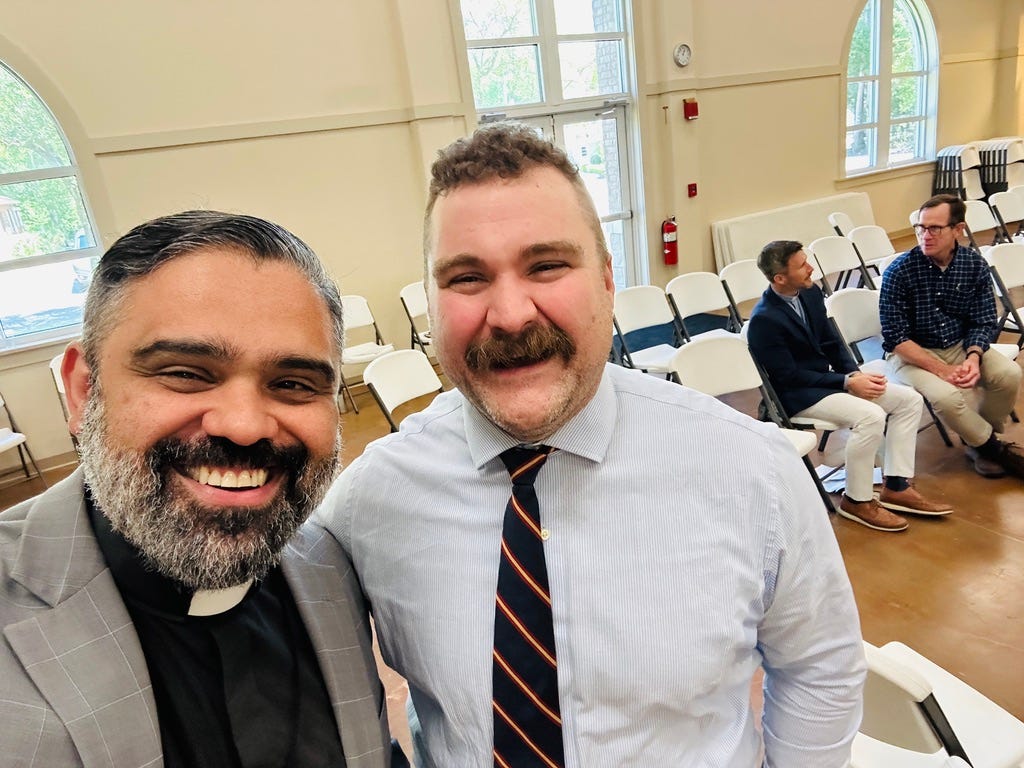On the Virtue of Goodness, Part 6: A Movement Towards Moral Order, TACTICS Conference, & Presbytery with Andrew Isker
We are called to goodness because the Spirit is good and therefore, we are—by God’s grace—good.
Nuntium
How many schools are putting on presentations based on the original storyline of any classic work? Trinitas Christian School in Pensacola, FL is one of them! I have been engaged in the life of the school for almost 17 years, and have a few young Brito men attending as well.
The presentation of Pinocchio was a Grammar School play, and my second youngest had the joy of playing a traveling actor and an undertaker rabbit.
I returned from presbytery a few hours ago, so the Perspectivalist did not go out as intended early this morning. Nevertheless, I am glad to say that Athanasius Presbytery went exceptionally well. We had a large group of pastors/elders/deacons, and guests represented. I am grateful for the labors of Athanasius PM Joe Thacker and Pro-Tem Rich Lusk and for Pastor Rossel hosting our presbytery. The food and fellowship were superb!
It was also good to see my old friend Andrew Isker visit Athanasius. You should listen if you haven’t seen his interview with Tucker Carlson!
I will judge a rhetoric competition this Friday morning in Pensacola and then head to Lafayette, LA, for the Tactics Conference. I will speak on the centrality of the Church and will be joined by Stuart Amidon, Jared Longshore, and a few others.
On the Virtue of Goodness, Part 6: An Act That Brings God's Favor and Missions to Brazil in Moscow, ID
We are completing our second triad of virtues. If I were to categorize them, I’d say that the first triad refers to the Holy Trinity (Father is love, the Son is joy, and the Spirit is peace), and the second triad refers to society (patience builds cultures, kindness establishes relationships, and goodness creates the moral compass of the land). The third triad will focus on family and self.
But for now, I wish to conclude this second triad by developing the theme of goodness. And to do so, we need to do away with a certain level of pietism that underlies a lot of our evangelical landscape. And it usually begins with slogans like these: “I am not perfect; I am just doing my best.” I understand what’s behind the sentiment. Why do we say that? We say it right after we’ve done something foolish, or when we are offering a defense of our bad decisions in the past or present.
Goodness Defined
No, we are not perfect, but Christians are called good in the Bible. John says we are to imitate what is good (3 John 11). Peter says that we are to add goodness to our faith (2 Peter 1:5). James says that we are to show our wisdom by our good life (James 3:13). If we weren’t good, why would Paul waste his time asking us to exercise the fruit of goodness or to eat from the tree of wisdom in Galatians 5? He would be just playing games with us if this were hypothetical.
We are called to goodness because the Spirit is good and therefore, we are—by God’s grace—good. We are good, like the creation of light in Genesis 1. God said it was good. Paul says in Romans: “Cling to what is good.” In the same chapter in Romans, Paul says, “I myself am convinced, my brothers and sisters, that you yourselves are full of goodness.” This is the same virtue Paul calls us to embrace. No, you may not be perfect, without sin, but God does not require perfection from you; he requires goodness, and goodness is a movement towards moral order. A society without order is doomed. If the West does not return to its intended goal, it will lose order, and therefore it will lose goodness. In sum, goodness is a moral movement towards order. Again, the Apostle says in Romans 15 that we are to please our neighbor for his good, to his edification. Why? Because when we pursue the good of our neighbor, we are bringing others into the realm of biblical order.
Is There Any Good?
But there is a particular allergy to the concept of goodness. When we hear these things, I think our minds go to another text in Romans where Paul says there is none good, no, not even one. Is Paul addressing the Church in Romans 3? No, actually, Paul is addressing those who have no fear of God in their eyes. To be more precise, he is quoting from Psalm 14, where the Psalmist says these are fools who say in their heart there is no God. Those are the ones to whom Paul says, “there is no one good, not even one.” Paul can find no divine sense of goodness in those whose hearts are intentionally corrupt and who boast in the wickedness of their tongue.
The Christian is good because he is indwelt by a Spirit who is good.
“Aslan is a lion- the Lion, the great Lion." "Ooh" said Susan. "I'd thought he was a man. Is he-quite safe? I shall feel rather nervous about meeting a lion"..."Safe?" said Mr. Beaver ..."Who said anything about safe? 'Course he isn't safe. But he's good. He's the King, I tell you.” -C.S. Lewis
But the fruit of the Spirit is goodness. We aspire to be like Jesus who was said in Acts, “He went about doing good.” We were made for good works. The idea of goodness is so intricately connected to Christ’s work that Paul makes goodness a substantial part of his exhortations to God’s people. How interesting that Paul spends very little time debating goodness. And I argue that instead of debating goodness, we should be busy doing good. Neither Jesus nor Paul ever says, “Hey, be careful because if you do too much good for your neighbor, if you go about meeting other people’s needs, you will be in danger of deceiving yourself.”
Pursuing the Good When It Is Not Desirable
Over the years, I have concluded that our problem is not a misunderstanding of good works but the lack of them. Of course, it’s possible to parade your goodness to others. We can join the goodness mafia and carefully monitor whether they do as much as we do, but it seems our tendency is that we don’t even have enough good works to sinfully parade them around.
Some produce good works with remarkable consistency. God will be your great rewarder. And I would suspect that being interrupted or inconvenienced to serve another person is a huge albatross/burden for others. “Why are they calling me? Don’t they have neighbors, aunts and uncles, and other relatives in other states that could help before they call me?”
Goodness is generally not glamorous or exciting; sometimes it’s picking someone up at the airport at 3 AM or mowing the lawn of an elderly neighbor; older children: sometimes it’s helping your little siblings with their homework or caring for them when mommy is exhausted. The best kind of good works are not Facebookable or Instagrammable. God is the rewarder of those who do good when no one is watching (Matthew 6:1). When we do good works, we are stabilizing our society and communities by adding moral order. We do good because it brings order to the lives of those who may need order and goodness in their chaotic lives.
From Whence Our Goodness?
Since we are all good theologians, we know our goodness does not come from within. We are bound by the rules of the Spirit, who is a Spirit of order, not confusion (I Cor. 14:40). We don’t move towards goodness like isolated agents. Goodness is pursuing order for the sake of the other. When we don’t commit our goodness for the benefit of the other or attempt to develop a moral order apart from God’s mercy in our community, our sense of goodness is marred. We can create a system that only benefits us. We can convince ourselves that we are pursuing a moral order while damaging everyone around us. If the way we order our lives does not include the good of others or the well-being of our Church, then you need a reset. You are not consuming the fruit of goodness, but some distorted version.
Goodness in the Calendar
And what is a healthy way to pursue order and blessing to the other in the body? God has given us time to restart! As Peter Leithart observes: “Time is Christianized by church calendars.”As of this writing, we are a few days from Palm Sunday, which culminates on Good Friday. Good Friday is the apex of God’s goodness in the sacrifice of Jesus Christ. And on Easter Sunday, God allows us to start again in our pursuit of moral order in our communities guided by God’s world. The Church Calendar is the restructuring of goodness for the sake of the body.
If you think about moral order in our culture, you must begin with the role of the Church in establishing goodness as a model. If goodness is the pursuit of moral order, then there is a distinct action required of us. We must be pursuers of moral order. Time orders God’s people. It’s not a matter of whether we follow a calendar; it’s which calendar we follow. The world outside the Church despises order because it knows order demands goodness, a moral foundation outside our own desires. This is why secularism tries to form its own calendars to celebrate its own pagan feasts, pagan gods, and pagan systems. So, here are a few ways we can begin to connect time to moral order:
First, goodness is to be manifested in our own lives. We need moral order. We need to re-examine our habits and rhythms, schedules, and seasons. We are not timeless creatures. We live within constraints. We all need to prepare well. There will be lots of opportunities to express goodness. We should be known for our love for goodness. But if you don’t have any moral order, you will bring chaos instead of goodness. So, get your house in order! It’s one thing to be where you are trying to figure things out, it’s another thing to want the order of the Church without wanting order within.
Second, goodness is to be manifested contextually. There will be parties, fellowship, and lots of joy. But sometimes these things can be disorienting. So, let me encourage you to sit down as families and prepare accordingly for Eastertide.
Every family knows their limits. Husbands need to know the frame of their wives and lead well in this area. If you have five events in three days, something must give. Enjoy, rejoice, get out of your comfort zone, and bring your good works along: works of service, baking, beautifying, encouraging, edifying, inviting, honoring, and celebrating the goodness of God, but pursue goodness, be self-aware of your limitations.
Finally, goodness is to be manifested biblically. This is where we could spend a lot of time delving theologically. If goodness is to be a part of our DNA as Spirit-empowered saints, we need to meditate on goodness. Goodness must be the norm. Make sure to find a good Easter read with the family. We need to meditate on God’s word day and night, which means we sing it, we pray it, and we contemplate it. If goodness is the virtue, then the good must be the norm. Don’t waste God’s order on trivial goodness, but seek the best goodness, the one that brings you closer to Jesus and a greater understanding of who he is.
Jesus Christ is the world’s true and perfect good. Apart from him, we are nothing. Christians are good because we are in him. When we seek goodness, we bring moral order and decency to our lives, church, and culture. When we honor time, we establish goodness as our moral compass. So, do good. Be good, even. But ultimately, love the One who is good for us now and evermore. Amen.
Uriesou T. Brito
FOLLOW ALONG
FACEBOOK / X / YOUTUBE / INSTAGRAM
PODCAST / KUYPERIAN / SUBSTACK







John, I'm not sure what you're implying. Andrew, whom I've known for over a decade, came to presbytery. We were courteous, we talked, and took a picture for ol' times' sake. I am not endorsing, nor do I follow Andrew's social media with any consistency. If these things are true and if he still desires to join the CREC, he will have to answer questions from delegates and the examining committee.
Isn't Andrew a Kinist? Are you endorsing Andrew for real?